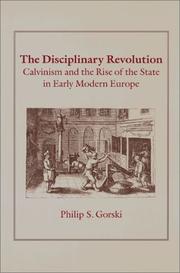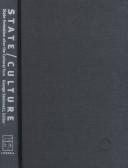| Listing 1 - 5 of 5 |
Sort by
|

ISBN: 0226304841 0226304833 9780226304861 0226304868 9781283150750 1283150751 9780226304830 9780226304830 9780226304847 Year: 2003 Publisher: Chicago University of Chicago Press
Abstract | Keywords | Export | Availability | Bookmark
 Loading...
Loading...Choose an application
- Reference Manager
- EndNote
- RefWorks (Direct export to RefWorks)
What explains the rapid growth of state power in early modern Europe? While most scholars have pointed to the impact of military or capitalist revolutions, Philip S. Gorski argues instead for the importance of a disciplinary revolution unleashed by the Reformation. By refining and diffusing a variety of disciplinary techniques and strategies, such as communal surveillance, control through incarceration, and bureaucratic office-holding, Calvin and his followers created an infrastructure of religious governance and social control that served as a model for the rest of Europe-and the world.
Calvinism - Europe - History. --- Calvinism -- Europe -- History. --- Christian sociology -- Reformed Church -- History. --- Church and state - Europe - History. --- Church and state -- Europe -- History. --- Church and state -- Reformed Church -- History. --- Church and state - Reformed Church - History. --- Europe -- Church history. --- Europe - Politics and government. --- Europe -- Politics and government. --- Sociology, Christian (Reformed Church) - History. --- Christian sociology --- Church and state --- Calvinism --- Religion --- Philosophy & Religion --- Christianity --- Reformed Protestantism --- Congregationalism --- Reformation --- Reformed Church --- Theology, Doctrinal --- Arminianism --- Puritans --- Zwinglianism --- Christianity and state --- Separation of church and state --- State and church --- State, The --- Christian social theory --- Social theory, Christian --- Sociology, Christian --- Sociology --- History --- Doctrines --- History. --- Europe --- Politics and government --- Church history --- Reformed Church&delete& --- Church history. --- Politics and government. --- Politics
Book
ISBN: 0814738737 0814738745 9780814738726 0814738729 9780814738733 9780814738740 Year: 2012 Publisher: New York, NY
Abstract | Keywords | Export | Availability | Bookmark
 Loading...
Loading...Choose an application
- Reference Manager
- EndNote
- RefWorks (Direct export to RefWorks)
The Post-Secular in Question considers whether there has in fact been a religious resurgence of global dimensions in recent decades. This collection of original essays by leading academics represents an interdisciplinary intervention in the continuing and ever-transforming discussion of the role of religion and secularism in today’s world. Foregrounding the most urgent and compelling questions raised by the place of religion in the social sciences, past and present, The Post-Secular in Question restores religion to a more central place in social scientific thinking about the world, helping to move scholarship “beyond unbelief.” Contributors: Courtney Bender, Craig Calhoun, Michele Dillon, Philip S. Gorski, Richard Madsen, Kathleen Mahoney, Tomoko Masuzawa, Eduardo Mendieta, John Schmalzbauer, James K. A. Smith, John Torpey, Bryan S. Turner, Hent de Vries.
Religion and sociology. --- Postsecularism. --- Post-secularism --- Post-secularity --- Religion and society --- Religious sociology --- Society and religion --- Sociology, Religious --- Sociology and religion --- Sociology of religion --- 316:2 "20" --- 316:2 "20" Godsdienstsociologie--21e eeuw. Periode 2000-2099 --- Godsdienstsociologie--21e eeuw. Periode 2000-2099 --- Philosophy, Modern --- Religion --- Secularism --- Sociology --- Postsecularism --- Religion and sociology --- Religious studies --- Sociologie religieuse --- Postsécularisation


ISBN: 1501717782 9781501717789 0801436737 9780801436734 0801485339 9780801485336 Year: 2018 Publisher: Ithaca, NY
Abstract | Keywords | Export | Availability | Bookmark
 Loading...
Loading...Choose an application
- Reference Manager
- EndNote
- RefWorks (Direct export to RefWorks)
What impact does culture have on state-formation and public policy? How do states affect national and local cultures? How is the ongoing cultural turn in theory reshaping our understanding of the Western and modernizing states, long viewed as the radiant core of a universal, context-free rationality? This eagerly awaited volume brings together pioneering scholars who reexamine the sociology of the state and historical processes of state-formation in light of developments in cultural analysis.The volume first examines some of the unsatisfying ways in which cultural processes have been discussed in social science literature on the state. It demonstrates new and sophisticated approaches to understanding both the role culture plays in the formation of states and the state's influence on broad cultural developments. The book includes theoretical essays and empirical studies; the latter essays are concerned with early modern European nations, non-European countries undergoing political modernization, and twentieth-century Western nation-states. A wide range of perspectives are presented in order to delineate this emergent area of research. Together the essays constitute an agenda-setting work for the social sciences.
Multiculturalism. --- Ethnicity. --- Culture. --- State, The. --- History, Modern. --- Nationalism. --- Cultural sociology --- Culture --- Sociology of culture --- Civilization --- Popular culture --- Administration --- Commonwealth, The --- Sovereignty --- Political science --- Modern history --- World history, Modern --- World history --- Consciousness, National --- Identity, National --- National consciousness --- National identity --- International relations --- Patriotism --- Autonomy and independence movements --- Internationalism --- Political messianism --- Cultural diversity policy --- Cultural pluralism --- Cultural pluralism policy --- Ethnic diversity policy --- Multiculturalism --- Social policy --- Anti-racism --- Ethnicity --- Cultural fusion --- Ethnic identity --- Group identity --- Social aspects --- Government policy
Book

ISBN: 0231548729 9780231548724 9780231190107 9780231190114 Year: 2019 Publisher: New York, NY
Abstract | Keywords | Export | Availability | Bookmark
 Loading...
Loading...Choose an application
- Reference Manager
- EndNote
- RefWorks (Direct export to RefWorks)
On Election Day in 2016, it seemed unthinkable to many Americans that Donald Trump could become president of the United States. But the victories of the Obama administration hid from view fundamental problems deeply rooted in American social institutions and history. The election's consequences drastically changed how Americans experience their country, especially for those threatened by the public outburst of bigotry and repression. Amid the deluge of tweets and breaking news stories that turn each day into a political soap opera, it can be difficult to take a step back and see the big picture. To confront the threats we face, we must recognize that the Trump presidency is a symptom, not the malady.Antidemocracy in America is a collective effort to understand how we got to this point and what can be done about it. Assembled by the sociologist Eric Klinenberg as well as the editors of the online magazine Public Books, Caitlin Zaloom and Sharon Marcus, it offers essays from many of the nation's leading scholars, experts on topics including race, religion, gender, civil liberties, protest, inequality, immigration, climate change, national security, and the role of the media. Antidemocracy in America places our present in international and historical context, considering the worldwide turn toward authoritarianism and its varied precursors. Each essay seeks to inform our understanding of the fragility of American democracy and suggests how to protect it from the buried contradictions that Trump's victory brought into public view.
Conservatism --- Political culture --- Culture --- Political science --- Conservativism --- Neo-conservatism --- New Right --- Right (Political science) --- Sociology --- History --- Trump, Donald, --- Trump, Donald J., --- Tramp, Donalʹd, --- Трамп, Дональд, --- 川普唐納德, --- The Donald, --- Donald, --- Trump, Donald John, --- United States --- Politics and government
Book

ISBN: 0231548710 9780231548717 9780231190084 Year: 2019 Publisher: New York, NY
Abstract | Keywords | Export | Availability | Bookmark
 Loading...
Loading...Choose an application
- Reference Manager
- EndNote
- RefWorks (Direct export to RefWorks)
Since 2012, Public Books has championed a new kind of community for intellectual engagement, discussion, and action. An online magazine that unites the best of the university with the openness of the internet, Public Books is where new ideas are debuted, old facts revived, and dangerous illusions dismantled. Here, young scholars present fresh thinking to audiences outside the academy, accomplished authors weigh in on timely issues, and a wide range of readers encounter the most vital academic insights and explore what they mean for the world at large.Think in Public: A Public Books Reader presents a selection of inspiring essays that exemplify the magazine's distinctive approach to public scholarship. Gathered here are Public Books contributions from today's leading thinkers, including Jill Lepore, Imani Perry, Kim Phillips-Fein, Salamishah Tillet, Jeremy Adelman, Nathan Connolly, Namwali Serpell, and Ursula K. Le Guin. The result is a guide to the most exciting contemporary ideas about literature, politics, economics, history, race, capitalism, gender, technology, and climate change by writers and researchers pushing public debate about these topics in new directions. Think in Public is a lodestone for a rising generation of public scholars and a testament to the power of knowledge.
English literature --- Literature, Victorian --- Victorian literature
| Listing 1 - 5 of 5 |
Sort by
|

 Search
Search Feedback
Feedback About UniCat
About UniCat  Help
Help News
News